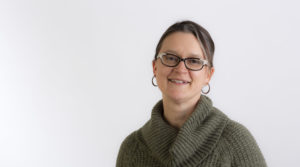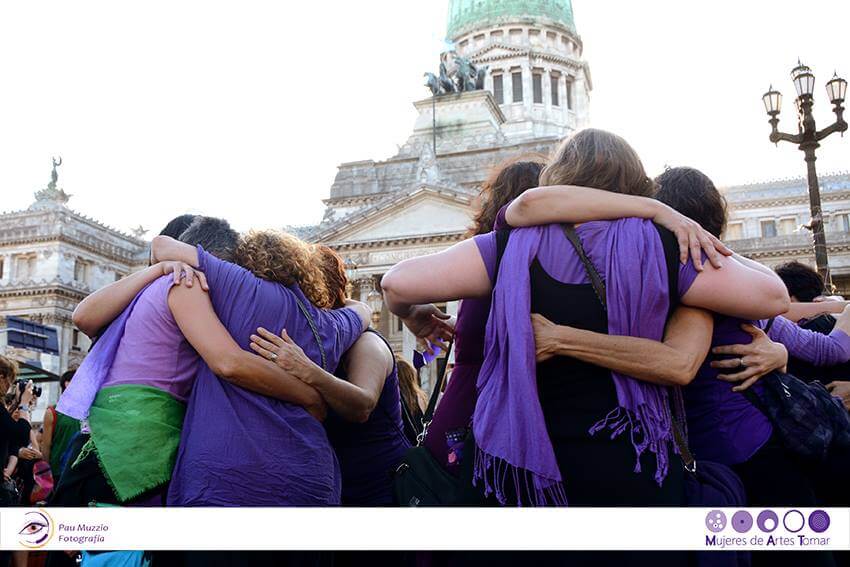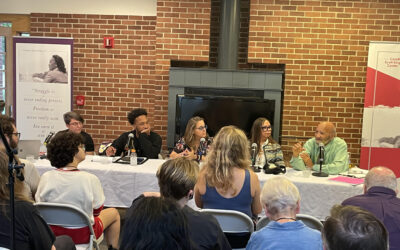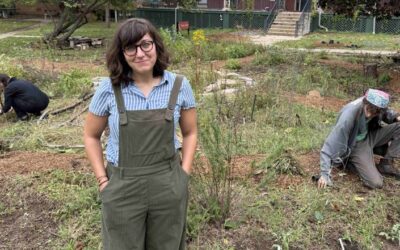During the month of February, Antioch College Associate Professor of Cooperative Education and Yellow Springs-native Luisa Bieri organized a transnational arts exchange with Mujeres de Artes Tomar (MAT)—a feminist performance activist troupe in Argentina—called Her Voice Rises. The artist residency was a project three years in the making connecting over 100 people from different corners of the globe who were able to tune into an Artist Talk, a two-day Workshop, and the world premiere Performance of Instructions for HOLDing Up (instrucciones de SOSten) on Zoom. While the global pandemic made holding events in person at Antioch College impossible, transitioning the residency to an online format using Zoom helped widen the reach of Her Voice Rises.
Luisa has a background in performance, women’s and gender studies, international education, and community engagement through the arts and joined Antioch’s Cooperative Education (Co-op) faculty in 2015. Luisa received her BA in Latin American Literature from Smith College and received her MA in Comparative Women’s Studies from Utrecht University in the Netherlands.
She has worked as a writer, a director, and a performer—exploring intersections of human rights, feminist thought, counter-memory, migration, ritual, and place-making. After joining Antioch’s Co-op faculty, Luisa designed new Co-op coursework engaging art as social practice, community action research, and place-based learning, focusing primarily on Co-ops, which include the arts and therapeutic practices as well as opportunities in Latin America.
Read our conversation with Luisa Bieri below to learn more about Her Voice Rises, as well as the difficulties and surprising benefits of organizing a transnational arts exchange during the time of COVID.

Associate Professor of Cooperative Education, Luisa Bieri
How did you meet Mujeres de Artes Tomar?
Shortly after I joined the faculty at Antioch in the fall of 2015, I was exploring a number of new Co-op opportunities in Argentina and one of the people that I spoke with was a former professor of mine, Maria Estela Harretche, from when I was an undergraduate at Smith College. She and I kept in touch and Estela told me, “Check these folks out.” She had just met them a few years earlier and had become involved in what they were doing, and so I did!
It was the fall of 2016 when our first Co-op student went to Buenos Aires specifically to work with Mujeres de Artes Tomar and that was Hannah Craig ’17. Hannah joined us from L.A. to participate in this performance series and Her Voice Rises programs.
How did the idea of organizing Her Voice Rises arise?
Even from that first meeting and well, the first Co-op with Hannah getting involved, I would say that one of the things that we prioritize with Co-op is the idea of reciprocity—that we and our students are giving back as well as receiving. There’s so much learning that happens on Co-op and so much mentoring. It’s such an important time of experiential learning for our students. One of the things that we ask people to think about is the idea of reciprocity with the communities in which they are doing their Co-op, and ask what they are contributing. How are they giving something of value and meaning to move the idea of reciprocity forward?
And so, while Hannah was on her Co-op, one of the projects that MAT asked Hannah to do was to research grants—national and international grants that could help bring more visibility to their work, extend their partnerships beyond Argentina. At that point, they had already traveled to the USA, where they had performed at Smith College and a few other colleges, but they were becoming interested in expanding the global scope of their work. Hannah was able to help with this, and she also helped them translate their website to have in Spanish and English to reach a broader international audience as well.
We had already started to discuss the idea of having them come to Antioch College; what if we could frame and write one of these grants around a residency at Antioch and bring them here? And so, over the span of the past four years, I’ve been working to develop ideas and bring them to fruition. First, I worked with a team of faculty to incorporate the idea of transnational exchange into a grant with the GLCA known as the Global Crossroads Initiative that Antioch was granted a number of years ago around efforts that we have put forth to internationalize our curriculum and to strengthen global teaching and learning at Antioch. That was the first step. This past year, in conversations with the arts faculty at Antioch, we decided to put forth this idea that was already well-developed and gained the support of Global Crossroads to put forward to the Ohio Arts Council. Last summer, we were informed that we had received the grant from the Ohio Arts Council, and we decided to go through with it, despite the pandemic, and hold a virtual residency.
Were you able to incorporate any ideas or attractions that would not have been possible at an in-person arts exchange?
Well, there are two things—one was that the global scope of the participation in the programming ended up being quite broad because we were able to connect with people wherever they were in the world. We saw that very much in the world premiere of their newest work that was part of the programming: the performance Instructions for Holding Up, which had an attendance of over a hundred people that night—many of whom were joining us from Buenos Aires to see the world premiere in Argentina. We also had people join in from all over the country as well, including Antioch Alumni and students—some who were studying on campus this term, and some who were studying from home remotely. We had faculty from Antioch, from some of the GLCA schools, and others join us as well. It was a real convergence of people from all over the country and around the world.
We also had the workshop component that was open for Antioch students and invited guests. I reached out to a number of recent alumni to invite them to join, and I was really delighted that many of them attended. Attendees included: Hannah Craig ’17, Greta Treistman ’17, Coco Gagnet ’18 (also current Community Manager), Odette Chavez-Mayo ’18, Hollyn Bermond ’19, Amanda Seigel ’21, Julia Hainzer ’21, Vanae Pate ’23, Erina McGuire ’24, and Jakia Walker ’24, as well as Nzingha Dalila, director of Counseling Services, and Rachel Price of the Greene County Violence Prevention Center.
What was the biggest challenge of organizing Her Voice Rises?
Logistics is always a challenge. There’s all the planning that goes into it, and then there’s the promotion and outreach: getting the word out to people, sending out invitations. We partnered with a number of folks who I was pleased to have participated, including Dawn Knickerbocker of the Greater Cincinnati Native American Coalition, Women of All Red Nations (W.A.R.N.) Ohio, and the Greene County Violence Prevention Center. The discussion of the intersections of movement building across the Americas to end gender violence was powerful, seeing the linkages between Say Her Name, Missing and Murdered Indigenous Women in North America, and Ni Una Menos (Not One Less) in Latin America.
I think the biggest challenge is that there is so much planning and preparation that goes into all the programming. That’s the behind-the-scenes work that we don’t see. Hannah Craig designed beautiful flyers, Sarah Mills ’22 and Michael Casselli ‘87 installed the exhibition, David Adkins and April Wolford ‘92 helped with the technical support of holding Zoom events, and Christine Reedy and Sophie Malon with Communications—a lot of people helped make it happen and I’m so grateful.
I also want to give a shout-out to former staff members Jennifer Wenker and Dawn Knickerbocker who rallied around the ideas for this program last spring and were instrumental to its success.

Mujeres de Artes Tomar (MAT)
To see a recording of Her Voice Rises’ Artist Talk or Instructions for HOLDing Up with a lively artist talkback afterward, visit the Her Voice Rises page on the Antioch College website.



